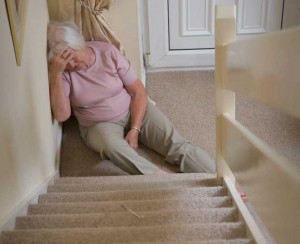Easy Ways to Reduce Fall Risk
 As people approach old age, declines in muscle mass and bone density, impaired vision and other sensory impairments, inner ear disturbances, side effects of some medications, and symptoms of some conditions can all increase the risk of a fall and fall related injury. The most common injuries from a fall are fractures, particularly hip and thigh fractures, followed by head injury. About 90{c8a638b1e7709e6694e28f267820d53a0efdb8b78b20236c90a8c073c646f8af} of hip fractures are caused by a fall, and fall related injuries are one of the leading reasons older adults are admitted to hospitals and nursing homes.
As people approach old age, declines in muscle mass and bone density, impaired vision and other sensory impairments, inner ear disturbances, side effects of some medications, and symptoms of some conditions can all increase the risk of a fall and fall related injury. The most common injuries from a fall are fractures, particularly hip and thigh fractures, followed by head injury. About 90{c8a638b1e7709e6694e28f267820d53a0efdb8b78b20236c90a8c073c646f8af} of hip fractures are caused by a fall, and fall related injuries are one of the leading reasons older adults are admitted to hospitals and nursing homes.
It may not be possible to completely eliminate the risk of a fall or fall related injury, but a few lifestyle changes can significantly reduce the risk of a fall and the likelihood of being injured if a fall does occur. Nutrition and exercise go hand in hand to build muscle mass and bone density, improve balance and reaction time, increase mobility, and promote heart health, which can help stabilize blood pressure and prevent blood pressure dips that can cause lightheadedness.
Dehydration and dips in blood sugar can both lead to dizziness and falls, so eating frequently and staying hydrated are vital to fall prevention. Dizziness can also be a symptom of nutritional deficiencies, including magnesium deficiency. Eating a nutrient rich diet and taking a good quality multivitamin every day can help prevent these deficiencies. Other causes of dizziness include inefficient cardiovascular function and cognitive impairments. Getting plenty of omega-3 fatty acids in the diet promotes healthy heart function, which can minimize the drops in blood pressure that can cause dizziness, and healthy brain function, which can protect against cognitive decline.
When many people think of bone health, the first thing that comes to mind is calcium. While calcium is important, magnesium and phosphorus are just as critical to building strong bones. Also critical is ensuring the minerals can be assimilated into the bone. Vitamin D helps the body absorb and assimilate calcium and other minerals, while some foods, particularly soda, can inhibit calcium absorption. It’s also important to be aware that calcium can only be absorbed in small amounts at one time, so consuming calcium rich foods a couple of times a day is important.
Many studies have shown that weight bearing exercise can increase bone mass reducing the likelihood of a fracture, and that a sedentary lifestyle can actually cause bone mass to decrease, increasing fracture risk. Weight bearing exercise may involve weights, but not necessarily. Walking, dancing, climbing stairs, lifting weights, or any other exercise that involves working against gravity will help move improve balance and mobility.
Weight bearing exercise also builds muscle strength, which provides added support to the bones and helps keep the joints stable and mobile. Be sure not to forget about upper body exercise. Keeping the spine strong makes it easier to stand erect; inability to stand erect can interfere with balance, making it harder to avoid falls. Strengthening the arms can improve your ability to stop a fall in progress.
If you’ve experience a fall or a fall related injury, or just want to know how to minimize your risk, call Neurobalance at 02 9938 5456 to arrange an appointment. We’ll talk to you about your conditions, your medications, and your lifestyle habits to help you determine your biggest risk factors for a fall, and we’ll help you determine the best ways to minimize your risk, including dietary changes you can make and exercises you can do to help improve your balance and mobility.